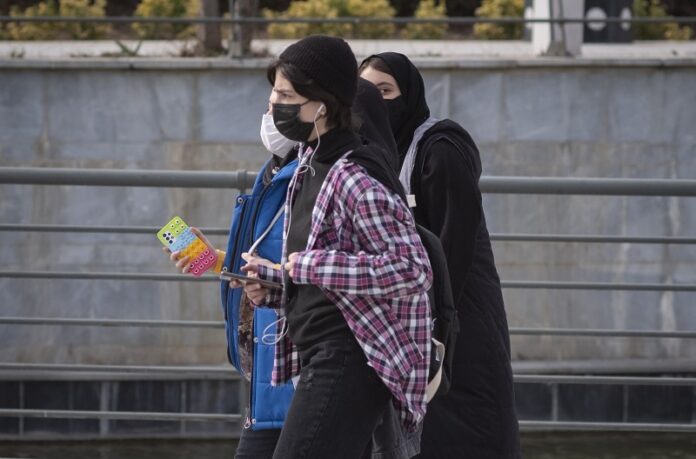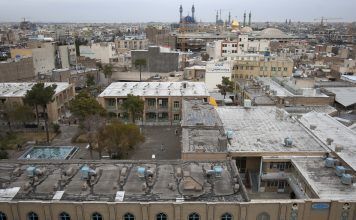By Kayhan Life Staff
Authorities in Minab, in the southern province of Hormozgan, arrested four female singers, charging them with working as DJs at a wedding, the Iranian Labor News Agency (ILNA) reported on June 26, quoting Ebrahim Taheri, prosecutor general for the public and revolutionary court in Minab.
“These four women singers worked at a wedding in this town [Minab]. Their case is under investigation,” Mr. Taheri said. “If this happens again, both the singers and the people holding the weddings will be arrested.”
The arrest of the singers is part of an alarming trend to further restrict women’s rights and freedoms.
Shortly after coming to office less than a year ago, President Ebrahim Raisi and his hardline cabinet set out to curb many women’s civil and legal rights.
The ultraconservative government has systematically tried to push women out of the workforce, ordered the Morality Police (Guidance Petrol) to enforce the Hijab law aggressively, promoted child marriages, banned female spectators from football matches, and withheld all legal, psychological, and financial support to victims of domestic abuse and rape.
Several alarming events in November 2021 showed systematic and institutionalized discrimination and abuse against women in Iran.
Iran Bans Screening Tests for Pregnant Women Under 35 With No Prior Abnormalities
On Nov. 9, at the request of Iran’s Vice President for Women and Family Affairs, Ensiyeh Khazali, the Administration and Recruitment Affairs Organization (ARAO), issued remote work permits for female employees with small children.
Although the ARAO issued its directive on Nov. 3, it was not published by the media until a day after President Raisi’s speech on Nov. 4, in which he said women should not work night shifts in factories and “must be shown special considerations so that they can be with their husbands and children during those hours.”
During a trip to Semnan, the capital of the north-central province of Semnan, President Raisi ordered factories and other industrial units not to put women on night shifts.
Many trade union representatives and civil rights activists argued that the remote work schemes might prompt many employers to hire primarily men, which would force more women out of the workforce.
Women were also the first victims of the economic downturn caused by the coronavirus pandemic.
A report by the Statistical Center of Iran (SCI) in November 2021 said female unemployment in Iran continued to rise. The overall unemployment rate stood at 9.6 percent in the summer. While male employment rose steadily since the summer, female employment fell. Some 177,000 women had lost their jobs by November 2021.
Later that month, the SCI said 9,753 girls aged 10 to 14 became child brides in the spring of that year, an increase of 39 percent from 2020. The figure was the highest three-month total recorded over a two-year period of child marriages by girls aged 10 to 14.
Another report by the SCI released at the end of November 2021 said almost all alleged victims of domestic violence registered in 2020 in Iran were women.
In February of this year, Esmail Rahmani, the deputy prosecutor for Mashhad, capital of the northeastern province of Khorasan Razavi, banned mixed-sex board games in all gaming cafes across the city. A joint statement issued by Mr. Rahmani’s office and by Mashhad’s Trade Union for Cultural Products, Games, and Entertainment warned that authorities would shut down any establishment that violates the new city regulation and “hold the owners accountable.”
Women started the Iranian New Year 1401 by holding nationwide protests on March 21. Iranian women, who have been victims of systematic and legally sanctioned discrimination under the Islamic Republic for the past 43 years, celebrated the New Year’s arrival by fighting for their human and civil rights.
A few days later, some 300 women working in the Iranian film industry broke their silence and released a statement calling for an end to sexual harassment, abuse, and violence in the industry. The statement marked the first time in the past 43 years that women working in various film industry sectors in Iran had shown such solidarity.
Iranian women continue to fight for their rights despite the Islamic Republic’s efforts to remove their freedom.
After the International Federation of Association Football (FIFA) issued the strongest ultimatum to the Islamic Republic last year, Iranian officials eased some restrictions on female football fans.
EXCLUSIVE- FIFA Officials to Visit Iran After Death of “Blue Girl”
However, on March 29, authorities in the holy city of Mashhad prevented female football fans from entering a sports stadium to watch a match between the Iranian and Lebanese national football teams.
A month later, Tehran’s Amirkabir University of Technology (AUT) football teams refused to play their match after university security removed female spectators from the stadium, according to social media posts by several student activists.
Most recently, the Iranian Minister of Health and Medical Education, Dr. Bahram Eynollahi, issued a directive on June 21 titled “Saving and Protecting Healthy Festus,” banning prenatal screening for pregnant women younger than 35 whose other children were born with no genetic disorder or Down syndrome.
Under the new guideline, pregnant women younger than 35 years old whose other children were born with no genetic disorder or Down syndrome should not undergo a screening test. The directive warned that “medical professionals who take part in an abortion procedure will lose their license, even if they perform it intentionally only once.”








